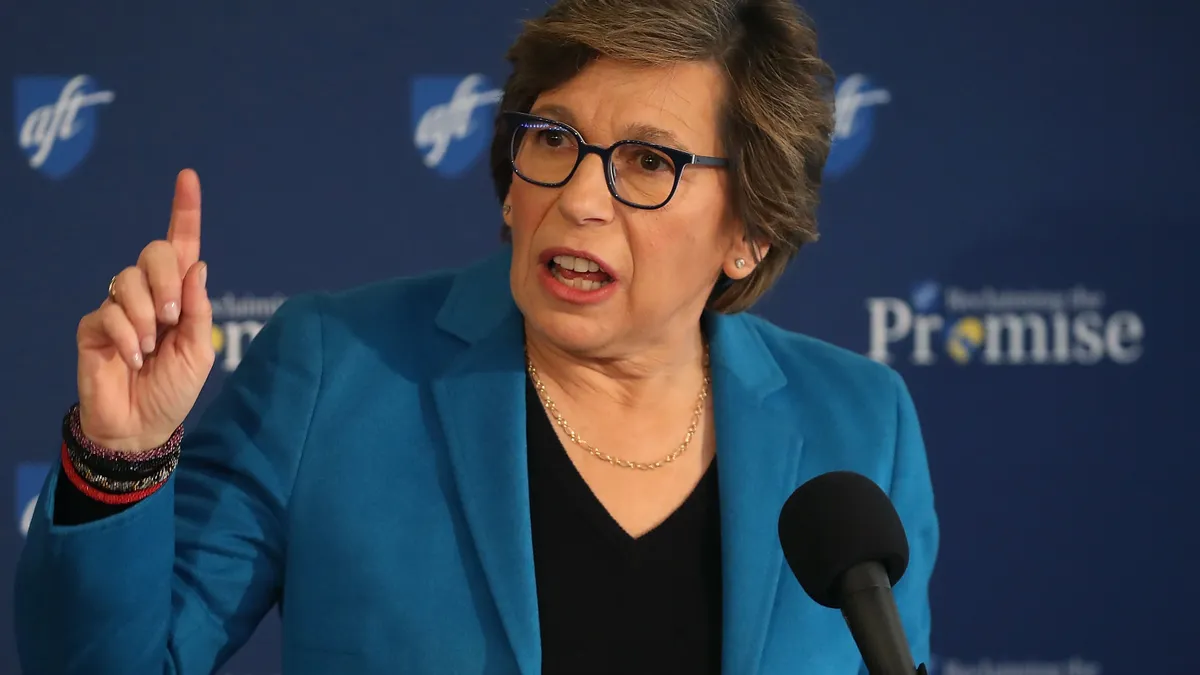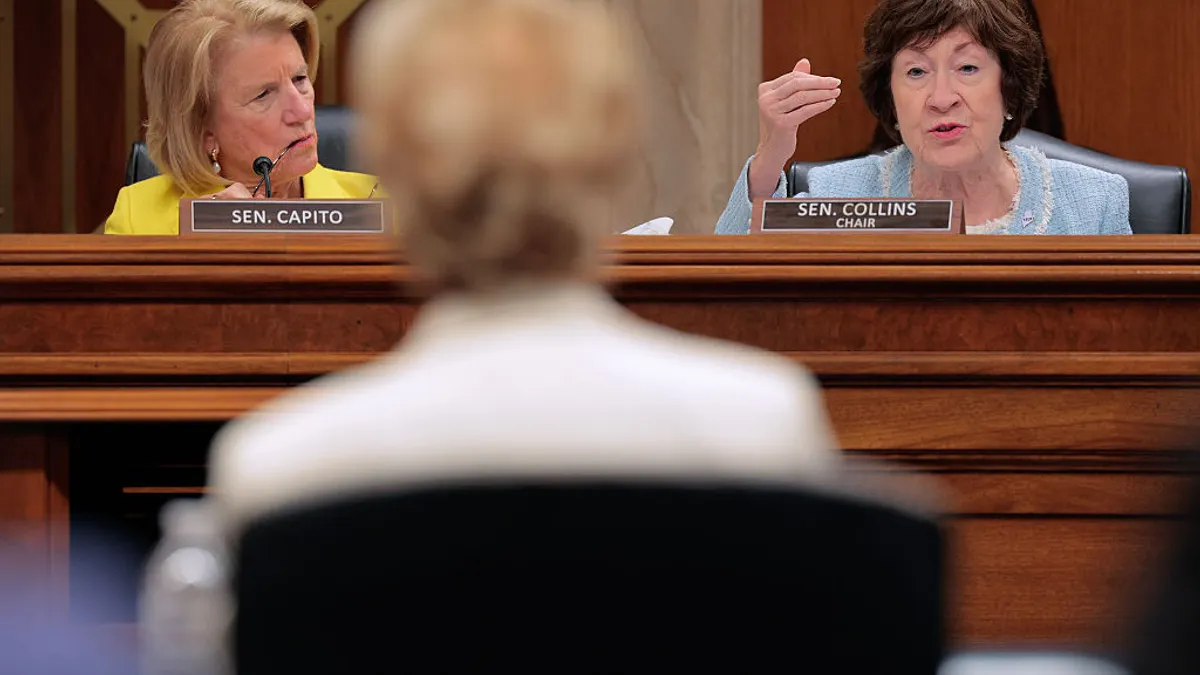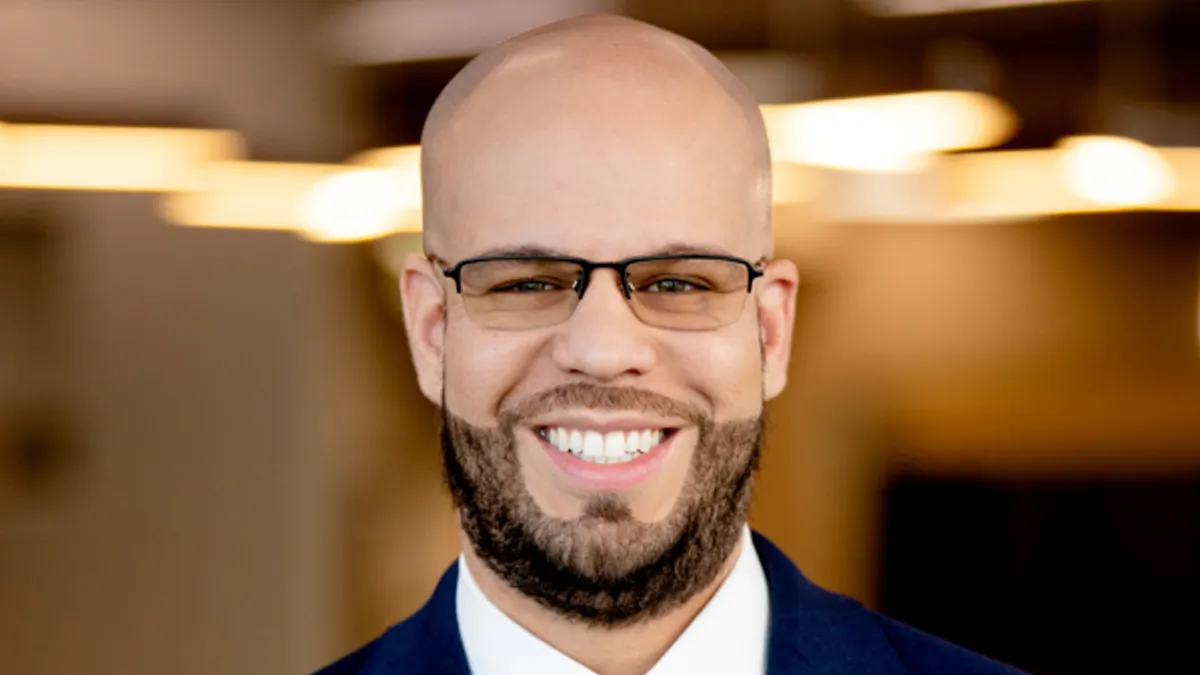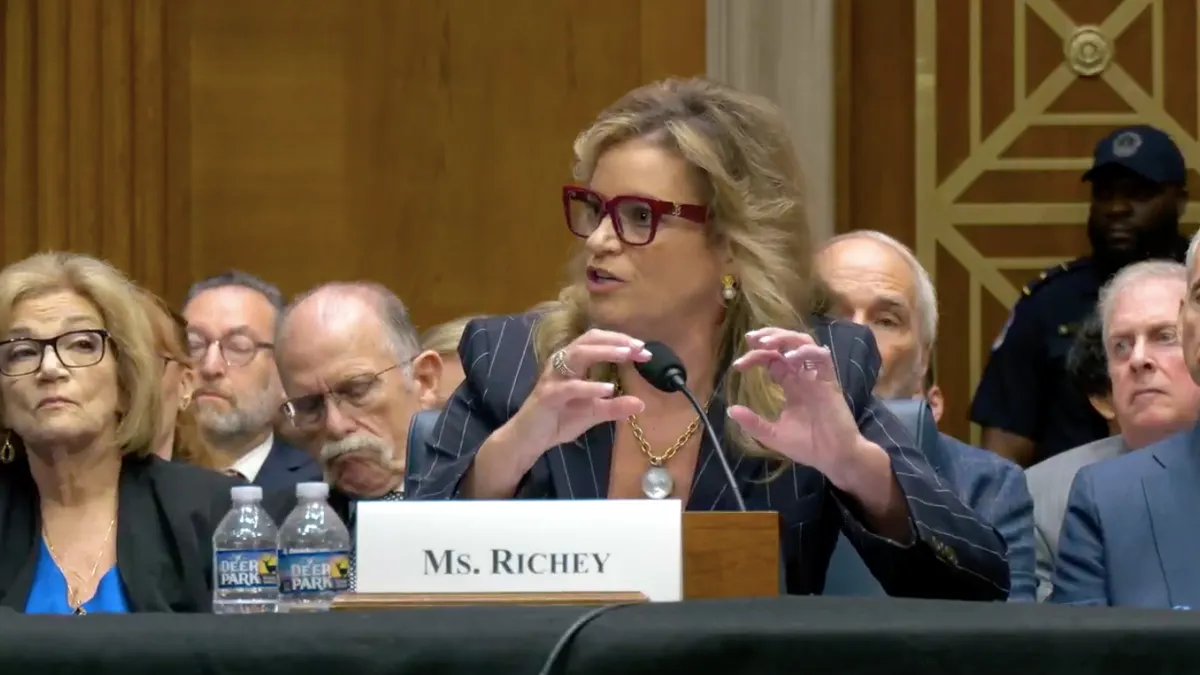AUSTIN, TEXAS — "Teachers are bone-tired. There's a lot of work they have to do to actually help lift kids" and help them "recover academically, socially, emotionally," American Federation of Teachers President Randi Weingarten recently told K-12 Dive. That itself "would be a lot of work ... but the political discord makes it worse and worse and worse."
Over the past two years, educators have navigated COVID-19 as they’ve faced a growing number of state bills prohibiting what they can and cannot teach in the classroom. The well-publicized so-called “Don’t say gay” bill passed by the Florida legislature is just one example of the political hurdles that Weingarten believes teachers need support to get through.
On top of that, a teacher shortage persists. The National Center for Education Statistics recently confirmed in a nationally representative study of 670 public schools that 44% of public schools report having full- or part-time teacher vacancies.
Weingarten was elected AFT president in 2008. Prior to that, she served for 11 years as president of the United Federation of Teachers, AFT Local 2, representing some 200,000 educators in the New York City public school system. As the second-largest teacher union in the country, the AFT has about 1.6 million members.
Weingarten sat down with us during this month's SXSW EDU conference, and throughout our conversation she shared her vision of AFT’s role to support teachers amid the continuing education culture wars and a teacher shortage worsened by COVID-19.
EDITOR'S NOTE: The following interview has been edited for brevity and clarity.
K-12 DIVE: What have you noticed in the past two years of the pandemic and censorship bills impacting classrooms? How have these two factors shifted the role of teacher unions?
RANDI WEINGARTEN: So, if you talk to any teacher — not just in America, but around the world — you will hear a version of "teachers want what students need." People will say it in different ways, but basically, people go into education to make a difference in the lives of children. They don't go into education for the money. They're not going into education because it's going to be easy. And they get infuriated, pre-COVID, that somebody would basically challenge their integrity or value proposition for doing this work.
But teachers are one of the most highly unionized occupations in America, because teachers have very little voice and agency by themselves. And they understood, from when unions really got a foothold in education in the 1960s, that having that collective voice of agency was the way of not only bettering their conditions, bettering their pay, but bettering the conditions of students.
What COVID did was that COVID initially made clear to the United States just how important public education was and is, and how important schooling is. How important teachers are. And what you have seen since that point is an intentional attack on public schools, on public school teachers and what we teach, on safety measures to make sure that people are safe and healthy.
So the anger I have, as you can hear it, is that we got real stuff to do. We have a huge amount of recovery to do for kids after two years of disruption. Teachers are bone-tired. There's a lot of work they have to do to actually help lift kids, [and help them] recover academically, socially, emotionally.
That would be a lot of work … but the political discord makes it worse and worse and worse. And it's intended to create the anger, to maintain the anger, and maintain the division and maintain the chaos and maintain the factionalism.
It's the political interference. It's the constant shaming and blaming. It's constant political attacks. It's actually attacking people and accusing them [teachers] of being something that just is completely antithetical to their core views. And then not giving them the tools and conditions they need for a really important job that they have.
So are they tired? Are they frustrated? Yeah. But they're aspirational agents. And so our job is to help support them and support parents and support kids in the recovery that we have to do for everyone.
How can teachers be supported in this environment?
WEINGARTEN: So what have we [the AFT] done in the last few years? The last year? You know, we've just started three new benefits that are pretty atypical for what you would think of as normal association benefits.
No. 1 … we have a trauma benefit where a member can have several conversations with a mental health provider.
We have a benefit to help people deal with student debt. And we have worked very hard to make public service loan forgiveness work for people, and make sure that people, if they have the time in public service and paid their debts for 10 years, that the rest of their debts get excused or forgiven and that they're in the right student debt program. It's called Summer and it's for free.
And, just last week with DonorsChoose, fulfilled the request of about 900 educators around the country, in terms of the supplies that they have been fighting for, wanting, needing. We worked with President Biden on the American Rescue Plan and making sure that schools got the resources that they needed. We worked to get those resources on a statewide basis, worked to support people in collective bargaining, in lifting up teacher salaries, and reducing staff ratios and fighting for nurses and guidance counselors and community schools.
What are the latest developments you've been seeing in the teacher shortage nationwide? What can teacher unions like AFT do to support?
WEINGARTEN: We believe that you have to really hear from your members and really work on an issue like teacher shortages, healthcare shortages — that the collective wisdom of members and leaders have to be part and parcel of what you propose.
So we have an educator shortage task force of leaders across the country that is working right now. They've met several times. We've done deep dives into them, and we will be prepared to have many recommendations probably as early as April.
We're doing the kind of polls that NEA [National Education Association] has done, as well. And we're seeing in that polling what NEA and others have seen, which is more people than ever who have been great teachers are thinking about packing it in. So people are thinking about leaving earlier than they would have.
Teaching has always been a high attrition profession because it's really hard to teach.
How would you describe the public sentiment toward teachers and teacher unions right now?
WEINGARTEN: There is a fight right now … over what that narrative is. When you listen to parents, and to the public, people are pretty grateful about what educators did in these last three years.
And 78% of parents said their kids' teachers were great, 72% of parents said their public schools did a good or great job. And then you're seeing it in terms of book banning: 80% of parents, most parents, want teachers to teach honest history.
You had lots of people who didn't know whether we should have masks on or masks off. That's part of the reason why we kept asking. In November, I wrote to the CDC [Centers for Disease Control and Prevention], and I said, "We need off-ramps for masks. We don't want to wear masks."
You know, personally, I don't want to wear a mask. I don't want to teach in a mask. My kids don't want to wear a mask. But we need a science-based off-ramp, so that we know, based upon the lens of safety, when you should lift the mask mandates. And the moment that CDC did that, look how many — even in schools — mask mandates got lifted.
The political battles here, to create a wedge, are very dangerous at the time when you are trying to help kids recover. What we need is to have the kind of community engagement and support, grace, gratitude, resilience, empathy to help more kids learn.
What are your hopes and concerns for both education and the state of teacher unions moving forward?
WEINGARTEN: Look, I'm a big believer that we're at a crossroads here. We're at a crossroads in America after a two-year disruption, you know, of anger versus aspirational. And teachers are aspiration agents. They need the tools and conditions to do their job to help a country recover and move forward. And in particular with our kids' social, emotional and academic needs.







 Dive Awards
Dive Awards













